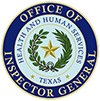Keep your emergency preparedness plan updated
The National Weather Service hurricane predictions for 2023 forecast 14-21 named storms, of which almost half could become hurricanes before dissipating. In preparation, long-term care facilities should review and update emergency response plans and review facilities to ensure they meet with health and safety requirements. In fiscal year 2023 the OIG conducted site visits to seven facilities where inspectors reviewed emergency preparedness plans, disaster response equipment and staff training. During the inspections, facilities met with most of the 23 federal and state requirements, however, some of the issues uncovered included:
- Not documenting initial employee training on emergency preparedness.
- Not ensuring the emergency preparedness plan identifies how alternate energy sources should be used to maintain the power needs of key systems.
- Failing to maintain a printed copy of the current emergency preparedness plan at each workstation assigned to a personnel supervisor who had responsibilities under the plan.
- Failing to document the required contact information for the state licensing and certification agency in its communication plan.
- Not sharing the emergency preparedness and response plan with residents and residents’ legally authorized representatives.
- Failing to request an annual fire marshal inspection.
Emergency preparedness is vital for care facility residents' ongoing health and safety during local incidents, like power outages or widespread natural disasters. Providers can find helpful preparedness resources at the DSHS Texas Ready website, including sample plans, disaster supply checklists, and more information on preparing for hurricanes and other emergencies.
These requirements apply to assisted living, nursing and intermediate care facilities, hospices and group homes. Preparing for a disaster includes planning for evacuation, transportation, communication, staff responsibilities and continuing resident care and treatment.
In an emergency, providers can visit Texas HHS Disaster Services for up-to-date regulatory support for health care facilities, long-term care facilities, and special waivers for Medicaid providers and clients as needed.

